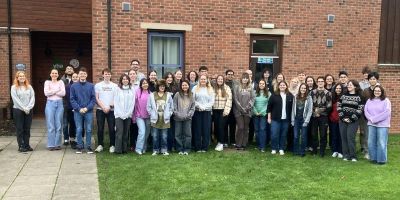Tackling Global Challenges

The University of Leeds is in the top three most successful institutions in the UK for securing funding for international research in low and middle income countries.
According to new data from Research Fortnight, the University of Leeds joins the University of Oxford and the London School of Hygiene and Tropical Medicine as one of the top three UK universities for global funding success.
53 different projects at Leeds are currently supported by awards from the Global Challenges Research Fund (GCRF) and the Newton Fund. These projects range from research to improve the quality of life of people in developing countries, to building communities, developing skills and tackling disease and represent more than £36 million secured from the two funds by the University over the last four years.
Here are some examples of the 53 projects carried out by academics from within the Faculty of Biological Sciences and supported by awards from the Global Challenges Research Fund and the Newton Fund.
Sustainable agricultural systems
Professor Tim Benton, Dean of Strategic Research Initiatives, is principal investigator of a research project which has received £7,913,847 of funding from the Global Challenges Research Fund (GCRF).
The project, entitled GCRF-AFRICAP - Agricultural and Food-system Resilience: Increasing Capacity and Advising Policy, aims to improve farming resilience in Tanzania, Zambia, Malawi and South Africa. Agriculture plays a key role in Africa’s economy both as an employer of millions and in the impact the industry has on the environment. Benton’s international team are focused on creating evidence-based policy that will lead to the development of sustainable and productive agricultural systems. The aim is to make farming more productive and resilient. Dr Lindiwe Majele Sibanda, former Chief Executive at FANRPAN, the project’s regional partner explains the objectives: “The partnership presents a unique opportunity for African and UK experts to develop a pathway for agricultural development that meets local needs, and creates an enabling policy environment. The ultimate objective is to increase the resilience of smallholder farmers in the face of changing climate and weather patterns.”
Professor Benton said: “This is about weather, climate, agriculture, economic growth, sustainability, livelihoods; with the end-game being how best to design policy for growth that is climate smart and sustainable. “We will review what can be done better, given what we know now, and what challenges we will face in the future, and consider how we should prepare for them. We know within our team we have the breadth of knowledge, understanding of how to operate in these countries and the experience of delivering projects of this scale to be successful. It is these assets which helped us secure the Global Challenges funding in the first place.”
Voices
"Voices" the projest of Professor Bill Kunin, Professor of Ecology and Deputy Head of School, looks at pollination and the control of pests on apples and has been awarded £602,831 by Biotechnology and Biological Sciences Research Council to support its development.
The research, focusing on two valleys where the orchards are concentrated, is particularly looking at the local “landscape context”, as well as differences in pest control methods and in ownership. Professor Bill Kunin says: “We’re also looking at the impact of planting floral strips – of either a single species or a complex floral mixture – on pollinators and natural enemies of crop pests, and ultimately on fruit production and quality. Finally, we’re looking at how the income flows from those apples (exported, sold to the domestic market or for processing into e.g. juice) get divided between farm expenses, farm labourer incomes, farm investment etc – and thus how they percolate through the local and national economy.”
The project is about half-way through its progress, meaning final results are yet to be made available.
Seeds of change
In a recent scientific paper, Professor Christine Foyer, Professor of Plant Science, and international colleagues argue that there is significant untapped potential for genetic improvements in legumes that could increase their potential as a sustainable global food source, but only if scientists work together to harness it.
A world-leading expert and passionate advocate of collaboration, Professor Foyer is playing a central role in establishing a global community of researchers who are working together to develop fresh approaches to developing new varieties of legumes. Professor Foyer's project Seeds of Change has received three awards of the total value of £17,000. "Across the research community legumes are being neglected. Increases in productivity have been lost, and the breeding of pulses has fallen behind as industry focuses on cereals,” says Professor Foyer.
One of the key advantages of growing legumes is that they are more self-sufficient than cereals. Plants in the legume family hold rhizobia a nitrogen-fixing bacterium within their tissue that enables them to collect atmospheric nitrogen. This helps to feed the plants, meaning they don’t need additional fertiliser to grow and develop. The work Professor Foyer and colleagues are doing could help improve conditions for those in the developing world. Failing to take action could have dire consequences. "If we keep on neglecting legumes we’re threatening food security” Professor Foyer adds. There’s a temptation to focus sole attention on the developing world, but the work of Professor Foyer and colleagues could have benefits closer to home too.
"Most of our pigs are fed on imported soya protein, and we import huge amounts of the food we eat,” Professor Foyer says. "An increase in demand from a growing population and a rise in prices through trade issues arising from Brexit means we could all benefit from increasing local production of legumes. There will come a time when there will be an economic need to produce our own protein sources,” she adds.
The University of Leeds has been at the centre of the international collaboration, providing what Professor Foyer describes as the "firm foundations” for its success.
Our faculty has over 130 academic staff, 14 independently funded research fellows and 200+ PhD students working at all levels of biological sciences, from molecules to landscapes. We are proud that, as a Faculty, our research is delivering significant benefits to society and industry.
“The Faculty of Biological Sciences is a vibrant, collaborative research community, spanning all areas of biological sciences from landscapes to molecules. Explore our research and innovation pages to view the strength and depth of our research teams and contact us if you have an interest in working together.” Professor Brendan Davies, Pro-Dean for research and innovation
Read more about research challenges in the Faculty of Biological sciences here.




